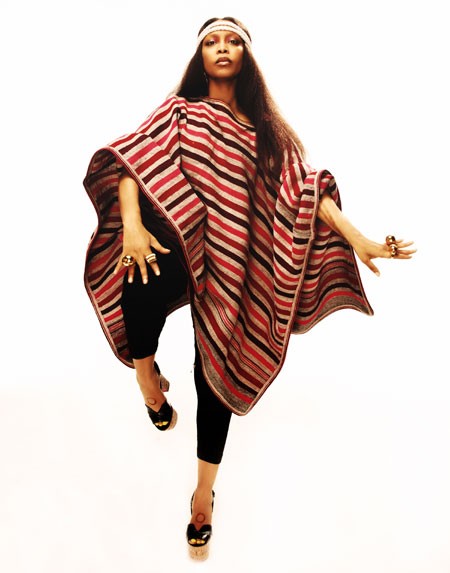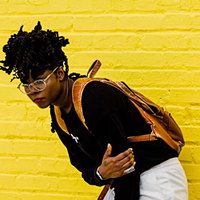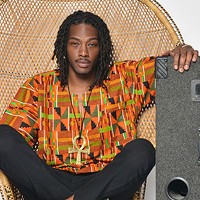Erykah Badu talks a lot about life's perfect circles. She talks about the earth. She talks about wombs, about birth canals and about babies.
Sometimes Badu talks about all this in between songs at her concerts, which are events, really. Her shows incorporate more than just her striking, iconic looks, sublime voice and the adventurous musicians who back her. She chats with her audiences, often using the language and symbolism of Nation of Islam theology or pan-African mythology to get at the essence of compositions like her first hit, "On & On," with its repeated line, "My cypher keeps moving like a rolling stone."

- Phil Knott
Badu, who performs at Ovens Auditorium on Oct. 20, has been moving like a rolling stone since at least 1997, when she arrived at the tail-end of a particularly interesting period in popular music with her ground-reaking debut, Baduizm. That album, along with D'Angelo's Brown Sugar two years earlier, expanded the language of traditional soul and R&B. Since then, Badu has collaborated with artists ranging from the Roots and Common to experimental electronics musician Steven Ellison (Flying Lotus), and she's appeared onstage with rock bands including My Morning Jacket. She's done controversial art videos in the nude — her guerrilla-style "Window Seat," and most recently, a psychedelic cover of "The First Time Ever I Saw Your Face," with Flaming Lips — and is currently working with the Brooklyn Philharmonic on an orchestral reinterpretation of her ambitious 2008 opus New Amerykah: Part One (4th World War).
Apart from her music, Badu serves as spokeswoman for the International Center for Traditional Childbearing, which promotes, among other things, breastfeeding, midwives and doulas, those who help bring humans into the world and also help usher them out. It's a perfect circle. "I love being a welcoming committee in making babies," she says with a laugh, then adds more seriously, "It's about transitioning, in or out. None of us knows anything. The main purpose here is to be of some kind of peace for each other as we go through these major transitions."
When we speak, Badu is experiencing one of life's minor transitions: a typical day of getting the kids — Seven, 14, Puma, 8, and Mars, 3 — from school to bed so she can have a little peace for herself. "Right now, I'm getting my hair braided," she says. "Earlier, I picked my kids up, cooked dinner." It's no different from any other day in the Badu household, she says. "We spend our evenings doing homework and playing Uno. At some point on most nights, somebody's gonna get a whoopin'" — she cackles — "then around 8 or 9, everybody gets ready for bed."
That's when Badu finds time for reflection in her Texas home that overlooks tony White Rock Lake in east Dallas; it's the time of day when Badu's life and art merge. "I put my headphones on," she says, "and listen to the things I've recorded and try to make sense of it."
Badu was 26 when she released Baduizm. Her nuanced phrasing — that lazy lilt and reed-like slur in "On & On" — echoed early-'50s Billie Holiday tracks like "Solitude" or "These Foolish Things." With "On & On" reaching No. 12, Baduizm went triple platinum, and the singer's live album later that year spawned another radio staple, "Tyrone," which won her a Grammy for best female R&B performance.
Badu returned in 2000 with the earthier Mama's Gun and another hit, "Bag Lady." Meanwhile, she'd been involved in high-profile relationships with OutKast's Andre 3000 (Seven's dad) and Common. And she'd begun the first of her many collaborations, including an appearance on the Roots' 1999 album Things Fall Apart and a 2002 duet with Common, "Love of My Life (An Ode to Hip-Hop)." But Badu was unhappy with her third album, Worldwide Underground, in 2003; she was in a rut and rode out her temporary creative existential crisis by focusing on her increasingly interesting live performances.
"I'm always perfecting my live show," Badu says. "I'm a live performer primarily. That's what I do. That's what I do best. I've been doing it for 14 years and everything else that I do, I do between performing."
In 2008, a full five years after her previous album, Badu returned with a vengeance. On New Amerykah: Part One, she supplemented the neo-soul of her early years with deep, heavy, Mothership-approved funk. It was a stunning comeback. From the cover art to the adventurous collaborations with Madlib, Dilla, Questlove, North Carolina's 9th Wonder and others, New Amerykah exploded with sound effects, treated spoken-word chatter and genre-defying stylistic clashes. And the tracks were poignant: songs about drug addiction, racism, cultural identity and the healing power of hip-hop. It was a dark masterpiece that is to the early 21st Century what Sly and the Family Stone's There's a Riot Goin' On was to the early '70s. What's more, Badu said she had two more New Amerykahs in the can. When Part Two (Return of the Ankh) arrived in 2010, it was similarly ambitious, but with lighter themes and less sonic density.
As for Part Three, "I've abandoned that project," Badu says. "I thought New Amerykah One and Two were balanced quite well and there didn't really need to be a third one." Instead, she's working on a different idea for her next solo album, in addition to projects with her band, the Cannabinoids — a group of psychedelic-minded Texas DJs and musicians — and a duet album with Flying Lotus, whose new album, Until the Quiet Comes, includes a strong Erykah Badu collaboration.
Ellison initially expressed apprehension about working with Badu, but the two have become kindred spirits. He recently told Pitchfork, "more than anything [having her on the album] made me more confident, because she reminds me of my mom, and that dynamic is weird."
Badu laughs. "We run in the same circle," she says. "So we all have kind of the same tastes in evolving music. We would just sit in Lotus' living room and create things."
Creating music with FlyLo is one thing — turning an avant-funk album like New Amerykah: Part One into an orchestrated work is quite another. How, pray tell, do you help the Brooklyn Philharmonic recreate experimental funk? "Maybe it's not necessary to do it that way," Badu suggests. "I mean, we've already discerned it and defined it the way it is, so maybe we want to recreate it as something totally different."
Fifteen years after Badu helped recreate the jazz, soul, R&B and rock that runs from Sun Ra and Miles through Funkadelic, Fela and Lee "Scratch" Perry straight up to TV on the Radio, she continues to blaze new paths for adventurous music fans in the so-called post-racial era. But don't ask her to define what she hears when she puts on her headphones at night to listen to her day's work. "I never really think about doing any specific kind of genre," she says. "We just kind of like to do music that feels good. It's not my job to name it and put it in an outfit."
On that live album from her first year in music, Badu had asked her audience, "Y'all know what a cypher is?" Then she went on an extended discussion of rolling stones and perfect circles, of the meaning of her ankh symbol, of the earth and its relationship with our bodies and our sexuality: "You and me — life. In all I do, I try to represent life, give birth to different things: melodies, music, prayers, babies."
Heavy stuff, no? Not to Erykah Badu. It's just life. Even Muddy Waters sang about it — a life that keeps on moving, "like a rollin' stone."

